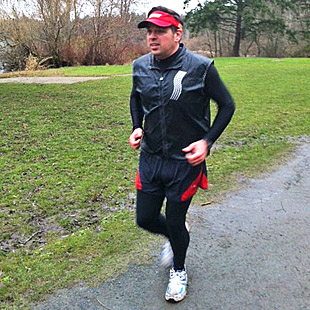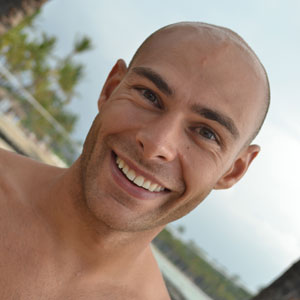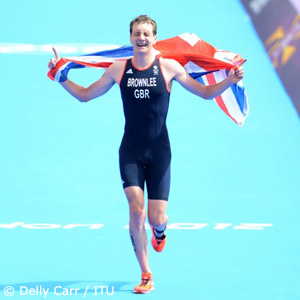The other life of Ollie Williams

Up to the 2012 Olympic Games in London, Ollie Williams was the Olympic sports reporter for BBC Sports and dealt with folks like Alistair Brownlee, but since then he has been busy in the Northwest Territories with aboriginal kids and their families.
Slowtwitch: You are still involved in sports, but it isn't about the Olympics or World Championships any more.
Ollie Williams: No, it’s not. Life has changed considerably since London 2012. I’m in the middle of a year-long career break, volunteering with aboriginal Canadian children and families in the Northwest Territories. Instead of reporting on sport, now I’m coaching football in a tiny community of around 500 people, 250km from the next town, in temperatures of -20C or below most mornings for the past few months. When you think that well over 100,000 people were in the Olympic Park at any one time during the Games, living in a village of 500 that’s so isolated is definitely a big change.
ST: How did you come up with that idea to move that far Northwest in the first place?
Ollie: My other half is Canadian and it hasn’t been easy spending time on the same continent. Early in 2012 we found the Frontiers Foundation, a charity working with aboriginal families in the Northwest Territories, and that seemed like a great way to explore a part of the world we both love (I’m fascinated by all northern places, culture and scenery), stay together in the same place for a while and hopefully do something helpful at the same time.
ST: How did you meet?
Ollie: We met at the Vancouver Winter Olympics in 2010, while I was reporting for the BBC and she was working for Canadian broadcaster CTV.
ST: I guess you are now about half way into that 10-month volunteer mission. Is the time flying by?
Ollie: It is. There’s plenty to do each day – I run around 20 hours of football* in our ridiculously small gym each week, plus I help out with all kinds of other events, literacy activities for the kids and organizing other sports for them to try like archery, snowboarding or skiing. And we have a few big trips as well. We took 20 kids aged eight to 17 on a yellow school bus for 1,300km down to Edmonton for a football tournament between Christmas and the new year. The bus broke down twice en-route, in temperatures of -33C. At one point I was sitting in the frozen bus, using a USB internet stick to Skype a local airline and get a quote for flying all of us to Edmonton instead. They wanted $23,000. We decided not to do that.

ST: You mean the budget decided that for you?
Ollie: This will sound ridiculous but if they’d said $10,000, we might have done it. It was a panicky situation. Luckily, a passing snowplough driver was able to get into the engine of the bus and make it work. By that point, the cold of the metal bus floor was seeping into my boots, and those boots are certified to temperatures of -50C. The sandwiches we had packed froze. Inside the bus.
ST: You had mentioned that your old job at the BBC is being held for you. Were the folks you worked with there surprised to hear that you had this mission in mind?
Ollie: I actually kept it quiet from most people there until midway through the Olympics, because we all had plenty of work to do and I definitely had more than enough to think about – plus I needed all kinds of documentation in place, so I didn’t want to mention it till I was absolutely sure I had the green light. So yes, I guess a few people were surprised when we’d sit in the media dining area at the Olympic Park and I’d casually mention I was leaving the BBC in a week’s time to move to the Northwest Territories. But people were also incredibly understanding. Lots of my colleagues had taken similar breaks and they had nothing but positive things to say.
ST: Well, for those who don't know, what exactly was your role at the BBC?
Ollie: For the last three years, leading up to London 2012, I was an Olympic sports reporter for BBC Sport. That meant writing for the BBC Sport website, reporting and producing for BBC TV (primarily for two series entitled British Olympic Dreams and World Olympic Dreams, on BBC One) and occasionally popping up on radio. And a lot of tweeting. The great joy of my job was that I got to focus, almost exclusively, on the actual sports and athletes rather than the big-picture political stuff that comes with any Olympics. Other people did the interviews with the politicians and examined Locog’s annual reports in minute detail – and those are important things to be doing – but I always wanted to be out at the events, meeting the athletes, telling their stories and I got to do that.
ST: You still deal with archery, running, skiing, football and other sports, but most likely with fewer spectators, less media and attitude.
Ollie: Definitely fewer spectators, and I’m the only media at most of our events with my little camera. We have a blog documenting our time here, so I try to take photos, record video or edit together podcasts when I can. Occasionally we get our photos on the front cover of the local paper – the Deh Cho Drum – if that counts? I’m not sure about less attitude, though. The kids here are tougher interviewees than most athletes I came across.

ST: Talk about the kids you work with.
Ollie: Alcoholism and drug abuse are huge problems in northern aboriginal communities, and with that comes a condition known as foetal alcohol syndrome or FAS. That’s the product of heavy drinking during pregnancy and it can have wide-ranging effects on children, from severe behavioural problems to developmental issues, memory trouble, and difficulty grasping abstract concepts or language, among many other things. It’s not at all nice and a lot of the kids I work with exhibit FAS to some degree. On top of that, home life for many kids here is horrific, to put it mildly. I can’t repeat some of the stories I’ve heard. Suffice to say some kids here don’t get a lot of sleep, for one reason or another, and have seen a lot of things. The brilliant thing is they’re all adorable, despite the various problems they have – they can be tough to work with some days but they’re such a bubbly, crazy, entertaining and persevering bunch that it’s inspiring. And they all love football, so that’s become my life for the time being.
ST: Have you picked up any new sports and or skills?
Ollie: I went for my first snowmobile ride last weekend. There is a huge amount of snow on the ground here and a friend kindly let us borrow his machine for the day, so we took it out across the frozen river, through our small corner of the boreal forest and up the hillside to a fire tower (a lookout point for forest fires in the summer). The views were incredible and learning to pilot a snowmobile was terrifying but fun – we only crashed a few times, and the snow is so soft that injury wasn’t an issue. I’ve also done a lot of snowshoeing and tried cross-country skiing for the first time, plus I’m suddenly an archery coach, which was fairly unexpected.
But the main things I’ve learnt are all to do with kids – managing them, interacting with them, coaching them, taking them on trips, all stuff I’d avoided like the plague till I got here and now I’m learning more about that every day.
I’ve also learnt how to best marinade and cook a wild bison steak. Vital knowledge for my return to Salford this summer.

ST: What sports did you partake in back home in Salford?
Ollie: I’m a cricketer back home but, as you can probably imagine, that’s gone by the wayside while I’m in Canada. I think the nearest cricket pitch is 3,000km from here. I left my bat at home which is a shame as I’d love to have shown it to the kids, who have little to no exposure to the game. There’s actually an aboriginal game here called Dene baseball (the Dene people being the local inhabitants), which is a cross between baseball and cricket with some similar rules.
ST: Speaking of the bus trip and the mechanical trouble you faced – is it kind of normal for you now to deal with whatever is thrown at you?
Ollie: Yes. Things change very quickly, here. Planning is an art form anywhere in the world but here it acquires a Jackson Pollock flavor. Kids don’t turn up, kids turn up at the wrong times, parents go missing – as in literally missing, for days on end – and occasionally whole events simply don’t transpire. Two weeks ago we were hoping to stage the first competitive ice hockey game in our tiny village for more than two decades. Two hours before the start, the driver for the other team (coming from 300km away) called us to say the whole team were “too drunk” to travel so they weren’t coming. That was the end of that. Two decades in the making.
ST: Do you think they were prematurely celebrating their possible win?
Ollie: If only we could blame it on that. Alcoholism is endemic here. But this strain of alcoholism, the way it works, has such a devastating effect on the way some of these communities function (or don’t). And it’s not as though I’ve ever felt remotely threatened by it, in a physical sense, while I’ve been here – Saturday nights in British town centers are far, far worse than the streets of Fort Liard – but it’s the effect that alcohol has behind closed doors, on families and kids. I see the end product of that in my football sessions and at the school… and in that hockey game, which was sad because the cancellation made “too drunk to travel” seem like a normal, everyday excuse to the kids. I had to explain to them that they need to be angry about that, they need to feel let down.

ST: We assume your recent wedding was a bit more planned.
Ollie: Well, we both turned up sober for it. Does that count? We decided we wanted to get married while we were in the Northwest Territories and, since there’s nobody to issue a marriage license in our village, nor a marriage commissioner to perform the ceremony, we had to do it while we were somewhere bigger. Those chances don’t come along often so, in the space of about a week, we managed to arrange for it to happen while we were on other business in the town of Fort Simpson, north of here. Just us, a justice of the peace, and two witnesses, standing on the banks of the frozen Mackenzie River. The whole ceremony lasted seven minutes.
ST: That is certainly a different spin on a white wedding, but did you ever imagine that you would get married in such cold and unforgiving conditions?
Ollie: The wind was the worst part. The temperature itself was only something like -10C, which is perfectly bearable by the time you’ve been through -30C or below, but the wind chill nearly took our hands off when it came to the exchange of rings.
ST: After that maybe everything should be possibly easier.
Ollie: We thought about tying a couple of cans to the back of the huge Ford F150 truck we’d borrowed from a friend to get us there – maybe with “Just married” etched in the dirt on the back window – but we were so cold, we threw ourselves in the truck and drove the four hours home. Our honeymoon was a football coaching clinic back in the village that weekend. Oh, the romance.

ST: What is next for you?
Ollie: I move back to Britain in June or July this year and then it’s back to Olympic life at the BBC, preparing for the Sochi 2014 Winter Olympics, although I’m hopeful that we’ll get to cover a lot of summer sports too. As for the rest of today, I’m off to a drum dance and feast in the community hall. Moose meat beckons me.
ST: Will you miss moose meat once you are back in the UK?
Ollie: It’ll be a sight harder to get hold of, that’s for sure (and it’s not easy here). It goes very well in stew.
ST: Anything else we should know?
Ollie: Don’t lick anything metallic when the temperature drops below -40C.
You can follow Ollie Williams on Twitter via @olliew
* When Ollie talks about football here, he really means what North Americans call soccer.







Start the discussion at forum.slowtwitch.com